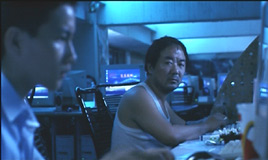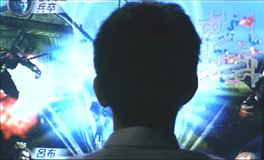The Missing (Lee Kang-sheng, 2003)
 The Missing, the directorial debut from Lee Kang-sheng, an actor known
almost exclusively for his involvement in the films of Taiwanese director Tsai
Ming-liang, proves that sometimes the apple doesnít fall very far from the
tree. Since it has a style similar to Tsaiís movies, and most of the same
thematic concerns, if one mistook The
Missing for the real deal, it wouldnít be surprising. With an
exceptionally thin plot that tells two parallel stories of emotional distance,
the movie is clearly more about mood and symbolism than plot event. The first
shot looks out from the inside of a fish tank, giving the visual impression that
the actors shown are prisoners within its glass walls. When the fish turn up
dead a few minutes later, the victims of a senile man who puts newspaper bearing
SARS-related headlines in their tank, the movieís attitude toward these
characters, and the society that imprisons them, is unmistakably stated. Itís
this mindset in which a shot of a woman straddling a toilet seat, desperately
trying to avoid contact with it, suggests her deeper alienation from other
humans. As in Tsaiís movies, The Missing
concentrates on outsiders to make a broader statement about society at
large.
The Missing, the directorial debut from Lee Kang-sheng, an actor known
almost exclusively for his involvement in the films of Taiwanese director Tsai
Ming-liang, proves that sometimes the apple doesnít fall very far from the
tree. Since it has a style similar to Tsaiís movies, and most of the same
thematic concerns, if one mistook The
Missing for the real deal, it wouldnít be surprising. With an
exceptionally thin plot that tells two parallel stories of emotional distance,
the movie is clearly more about mood and symbolism than plot event. The first
shot looks out from the inside of a fish tank, giving the visual impression that
the actors shown are prisoners within its glass walls. When the fish turn up
dead a few minutes later, the victims of a senile man who puts newspaper bearing
SARS-related headlines in their tank, the movieís attitude toward these
characters, and the society that imprisons them, is unmistakably stated. Itís
this mindset in which a shot of a woman straddling a toilet seat, desperately
trying to avoid contact with it, suggests her deeper alienation from other
humans. As in Tsaiís movies, The Missing
concentrates on outsiders to make a broader statement about society at
large.
 Despite the thematic familiarity of The Missing, the movie lacks formal rigor when compared to Tsaiís
works. The sound design is uninspired in comparison, the visual metaphors feel
like secondhand imitations of superior ones, and even though great shots, such
as a videogame reflected in the close-up of a boyís pupil, occasionally
surface, the effect is often stunted due to an overlong duration or a repetition
of the image. Invariably, the shallow content combined with Leeís less than
stellar filmmaking results in flagging interest. There are some sequence shots,
which means thereís a more mobile camera than in any of Tsaiís movies, but
the biggest difference between the two directorsí work is that the sense of
humor is toned down considerably in The Missing. Where it does feel like one of Tsaiís movies, though,
is in its consummate compassion toward its characters.
Despite the thematic familiarity of The Missing, the movie lacks formal rigor when compared to Tsaiís
works. The sound design is uninspired in comparison, the visual metaphors feel
like secondhand imitations of superior ones, and even though great shots, such
as a videogame reflected in the close-up of a boyís pupil, occasionally
surface, the effect is often stunted due to an overlong duration or a repetition
of the image. Invariably, the shallow content combined with Leeís less than
stellar filmmaking results in flagging interest. There are some sequence shots,
which means thereís a more mobile camera than in any of Tsaiís movies, but
the biggest difference between the two directorsí work is that the sense of
humor is toned down considerably in The Missing. Where it does feel like one of Tsaiís movies, though,
is in its consummate compassion toward its characters.
 One characterís panicked search leads
her, out of desperation, to her dead husbandís tomb. She appeals to her dead
husbandís ghost to help her find her missing grandson, thereby revealing her
selfish reasons for wanting to find him. ďIf heís gone, they wonít want me
any more,Ē she cries, referring to her children, who entrusted the boy to her.
She worries not about the childís safety, but about her sonís reaction, yet
she isnít being scorned for it. The movie is more concerned with understanding
than condemnation, and as a result, through this frantic appeal, she begins to
resolve her emotional issues. When a boy scarcely notices that his grandfather
has disappeared, the film is patient enough to wait for him to develop a sense
of responsibility and guilt, instead of taking an immediately judgmental stance.
Such compassion makes sense in a movie that is so steadfastly aligned against
loneliness and disaffection.
One characterís panicked search leads
her, out of desperation, to her dead husbandís tomb. She appeals to her dead
husbandís ghost to help her find her missing grandson, thereby revealing her
selfish reasons for wanting to find him. ďIf heís gone, they wonít want me
any more,Ē she cries, referring to her children, who entrusted the boy to her.
She worries not about the childís safety, but about her sonís reaction, yet
she isnít being scorned for it. The movie is more concerned with understanding
than condemnation, and as a result, through this frantic appeal, she begins to
resolve her emotional issues. When a boy scarcely notices that his grandfather
has disappeared, the film is patient enough to wait for him to develop a sense
of responsibility and guilt, instead of taking an immediately judgmental stance.
Such compassion makes sense in a movie that is so steadfastly aligned against
loneliness and disaffection.
 The stories Lee tells intersect twice,
once briefly to no real effect, and again later for the cathartic but ambiguous
finale. In a surprising shift from whatís come before, we see connection made
between two characters, finally, even though it manifests itself through
hysteria. Like Tsaiís films, The Missing
believes that we can learn as much from watching a characterís routine
actions as from their moments of crisis. As such, there are numerous scenes in
which characters perform mundane tasks. Even the plot, which is concerned with a
boy lost in a park and a senile man who wanders off, is the commonplace stuff of
life. The movie exists mostly to demonstrate the built-in ways that modern times
allows us to cut ourselves from others. This thread exists in obvious
metaphorical ramifications of the plot and in most small scenes, such as the one
in which two men in an internet cafe chat to each other on the computer despite
the fact that theyíre sitting next to each other. Tsaiís languidly paced ode
to cinema Goodbye, Dragon Inn drove
many to frustration with its determined uneventfulness. More happens in The
Missing, purportedly a companion film (seemingly for marketing reasons as
much as anything), but the results, while admirable, feel far less passionate
than the mixture of nostalgia and decay that Tsai managed there. The
Missing is a promising debut by any standards, but that doesnít mean it
lives up to Tsaiís standards.
The stories Lee tells intersect twice,
once briefly to no real effect, and again later for the cathartic but ambiguous
finale. In a surprising shift from whatís come before, we see connection made
between two characters, finally, even though it manifests itself through
hysteria. Like Tsaiís films, The Missing
believes that we can learn as much from watching a characterís routine
actions as from their moments of crisis. As such, there are numerous scenes in
which characters perform mundane tasks. Even the plot, which is concerned with a
boy lost in a park and a senile man who wanders off, is the commonplace stuff of
life. The movie exists mostly to demonstrate the built-in ways that modern times
allows us to cut ourselves from others. This thread exists in obvious
metaphorical ramifications of the plot and in most small scenes, such as the one
in which two men in an internet cafe chat to each other on the computer despite
the fact that theyíre sitting next to each other. Tsaiís languidly paced ode
to cinema Goodbye, Dragon Inn drove
many to frustration with its determined uneventfulness. More happens in The
Missing, purportedly a companion film (seemingly for marketing reasons as
much as anything), but the results, while admirable, feel far less passionate
than the mixture of nostalgia and decay that Tsai managed there. The
Missing is a promising debut by any standards, but that doesnít mean it
lives up to Tsaiís standards.
53
Jeremy Heilman
06-08-04